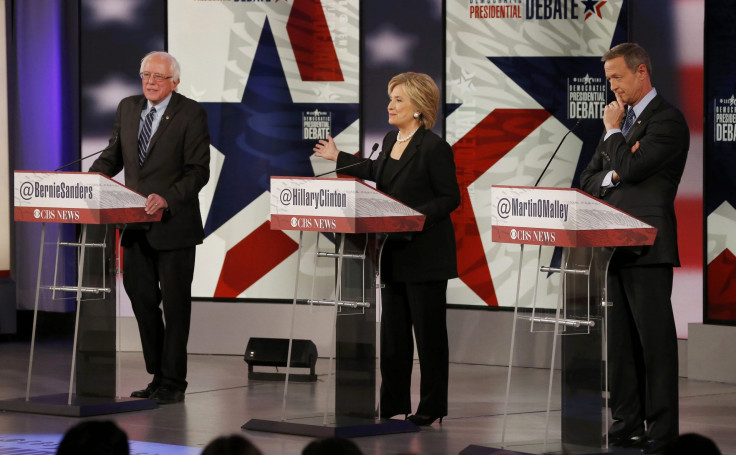Democratic Presidential Candidates Debate For Second Time, Focus More On Affordable Health Care

The Democratic presidential candidates took the stage at Drake University in Des Moines, Iowa to debate for a second time on Saturday. If you tuned in, you noticed there were fewer candidates than the first time around — James Webb (D-Va.) and Lincoln Chafee (D-R.I.) have since resigned their campaigns, leaving former secretary of state Hillary Clinton, independent senator Bernie Sanders, and former governor of Maryland Martin O’Malley.
The debate began somberly, with each candidate reflecting on the terrorist attacks carried out in Paris in their opening statements. The natural segue, then, for moderator John Dickerson was to ask questions about foreign policy — the number one issue, according to Twitter. The debate kept a close eye on the social media site throughout the night, nothing when candidates were "trending" and taking questions from users about key issues: in addition to foreign policy, those issues were related to health care, income equality, comprehensive immigration reform, Wall Street, and gun control.
During the last debate, health care was hardly mentioned, which we're happy to say was not the case this time. Sanders was the first to say health care should be a right, not a privilege — a belief held by each candidate — adding a "single-payer system is the way to go;" O’Malley agreed. This system, also known as "Medicare for all," works so people still choose their medical providers, but the state foots the bill. An appealing idea, but its one The Washington Post reported many worry could "bankrupt the U.S."
Clinton, though once a support of the single-payer system, has said she plans to defend and expand upon President Obama's Affordable Care Act. She believes "we made great progress with the [ACA]" when it comes to health care costs and wages, and spoke more about the prescription drug costs. Clinton believes we'll "have to redo how the prescription drug companies do business...and get Medicare the authority to negotiate." Sanders also spoke of lowering prescription drug costs and lessening the number of patients who go to neighboring Canada in order to get the medications they need.
The state of mental health care was mentioned once by Sanders when answering a question about gun control, something mental health advocates have called out Republican presidential candidates for doing in the past; he said people feeling "suicidal and homicidal" should have better access to care. Coupling the two issues together unintentionally fuels mental health stigma, namely that mentally ill people are prone to violence. Prior studies have shown a "large majority” of those with mental disorders don't aren't violent toward others, with fewer than 5 percent of 120,000 gun-related incidents committed by those with disorders.
Paid family and medial leave is another idea tossed around by Sanders and Clinton mentioned a few times, though it wasn't explored in-depth. This is more than we can say for reproductive rights, which for a second time was not brought up for debate at all. Clinton did mention Planned Parenthood (as she did in the first debate), but other than that, neither Dickerson nor the rest of the candidates addressed the defunding measures frequently led against Planned Parenthood, which Medical Daily has previously reported could jeapordize both women's and men's health. This is especially surprising considering the U.S. Supreme Court agreed to hear an abortion case on Friday that could overturn Roe v. Wade.
Maybe the third time's a charm? The next presidential debate will take place in New Hampshire on Saturday, Dec. 19.



























